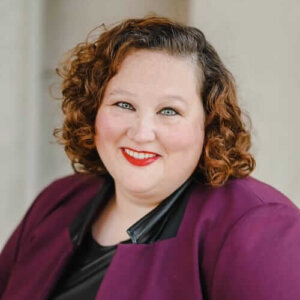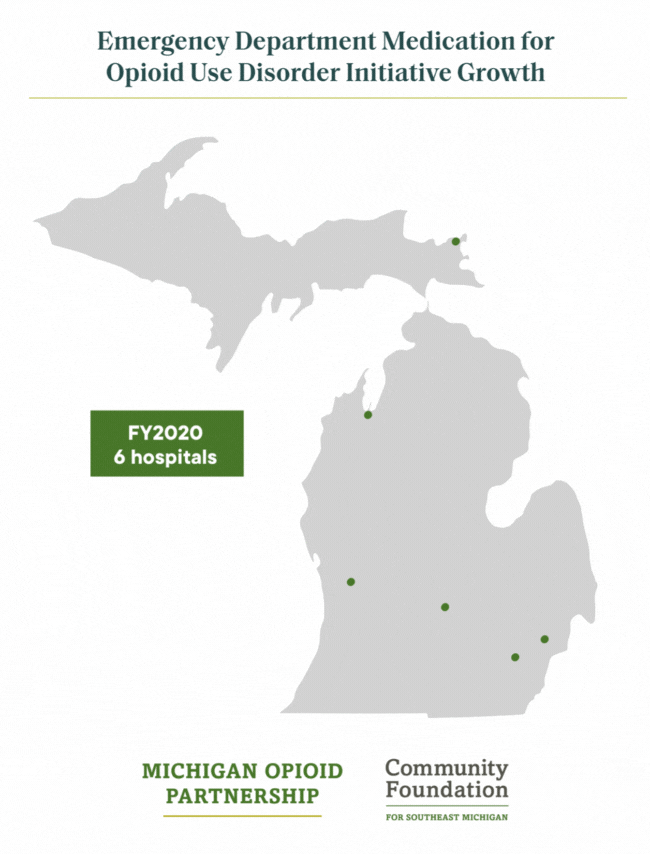
The Community Foundation for Southeast Michigan and its Michigan Opioid Partnership created an early alliance with the Michigan Health & Hospital Association Keystone Center (MHA Keystone Center) in its fight to decrease opioid overdose deaths. Founded with the mission to support healthcare providers to achieve excellence in the outcomes desired by the people they serve, the MHA Keystone Center engages its member hospitals in driving large-scale quality improvement in healthcare across the state.

Sarah Wedepohl, Vice President, Program
The two organizations realized streamlining access to medication for opioid use disorder (MOUD) and post-overdose care were vital to curbing the nearly 3,000 opioid-related deaths Michigan families experienced last year. “We wanted to get a sense of how receptive emergency departments would be to starting MOUD programs, and all hospitals in the state are MHA members,” said Sarah Wedepohl, Vice President, Program, at the Community Foundation.
The MHA Keystone Center received a Michigan Opioid Partnership (MOP) grant to encourage its members to launch the Emergency Department Medication for Opioid Use Disorder (ED MOUD) program.

Michelle Norcross, MHA Keystone Center’s Senior Director of Safety and Quality
“Eight overdose deaths happen every single day in Michigan,” according to Michelle Norcross, MHA Keystone Center’s Senior Director of Safety and Quality. “The partnership with the Community Foundation is tremendous because it allows us to meet our goal of providing EDs with the resources to treat substance use disorder and be part of the solution.”
 The Community Foundation and MHA Keystone Center focused on recruitment, growing the number of hospitals integrating MOUD into their emergency departments from six to 75 over four years. This represents approximately half of Michigan’s emergency departments and all ten prepaid inpatient health plan regions.
The Community Foundation and MHA Keystone Center focused on recruitment, growing the number of hospitals integrating MOUD into their emergency departments from six to 75 over four years. This represents approximately half of Michigan’s emergency departments and all ten prepaid inpatient health plan regions.
Shared Goals Lead to Program Growth
Identifying hospitals interested in expanding services to opioid use disorder (OUD) patients was an essential first step to launching a statewide MOUD initiative. “We knew the MHA Keystone Center was an asset in helping us to achieve our goals of having MOUD in every hospital in Michigan,” Wedepohl said. The foundation and association collaborated to create educational materials to motivate hospitals to adopt MOUD as a best practice and inform them about MOP funding.
“The MHA Keystone Center worked alongside the Community Foundation to fill a convening role, hosting activities and events to gather hospitals with the capacity and ability to tap in now,” recalls Norcross. The partners’ common objective was to espouse the benefits of MOUD by sharing outcomes experienced by health systems in other parts of the country, such as Colorado and California. “We wanted to demonstrate how these programs enabled EDs to treat people in overdose or who are identified as having opioid use disorder,” says Wedepohl. The MHA Keystone Center produced a video and promoted MOUD and the MOP grant opportunities in its newsletter and other communications.
Managing Transitions
“We’ve been working closely with the MHA Keystone Center to figure out how to sustain this work once the funding ends,” says Wedepohl, mentioning to the conclusion of the Community Foundation’s grant opportunities for ED-based MOUD programs. She and Norcross agree that service gaps for OUD patients still exist, despite increasing the number of participating hospitals by more than ten-fold. “Only about half of Michigan’s emergency departments offer MOUD, which does not provide the entire population access,” observes Norcross. She shared the MHA Keystone Center’s commitment to helping Michigan hospitals navigate the pervasive opioid epidemic and provide quality care to OUD patients.
While the association and foundation seek new funding opportunities, the MHA Keystone Center will offer ongoing supplemental educational resources surrounding inpatient and ED MOUD via its academic detailing platform created in partnership with the Michigan Center for Rural Health. With support from Blue Cross Blue Shield of Michigan, the organization was able to expand upon existing offerings to foster peer-to-peer, provider-based conversations on the benefits of MOUD. Academic detailing is interactive educational outreach to physicians – often provided in a one-on-one setting – that offers unbiased, non-commercial, evidence-based information about medications and other therapeutic decisions to improve patient care.
“We’re hoping to engage those interested in MOUD through training recordings and webinars available on the Community Foundation’s website and potentially build courses that sustain long-term learning about the protocols following the conclusion of this current funding,” explains Norcross. Though the MHA Keystone Center agrees the program needs additional dollars for implementation, the organization believes these educational resources will lift MOUD as the gold standard for providing compassionate, human-centered care to people with OUD.
The academic detailing course equips clinicians with the tools necessary to have productive conversations within their organizations about the benefits of initiating an ED MOUD program. It provides them with a roadmap to engaging decision-makers, asking appropriate questions, and finding resources. The course also addresses the ongoing stigma in treating people with OUD. It helps providers reposition the narrative about use disorders from moral failure to a diagnosable clinical condition, treatable with proven medications. The National Institute on Drug Abuse’s Words Matter and the Superior Health Quality Alliance’s Shine a Light on Stigma Campaign are among the tools providers can access to mitigate stigma. “Education is a huge piece to help communities understand why MOUD in the ED is critically important within all areas of Michigan,” Norcross emphasizes.
Wins and Next Steps
Norcross points to the number of hospitals starting MOUD in the ED during the pandemic as a success. “COVID significantly impacted every single hospital, and specifically emergency departments. It shows that this program is vitally important, that hospitals care about those with substance and opioid use disorders, and that they want to be part of the solution,” she effuses. She says patients getting ongoing treatment for their condition is also a win. Still, another success is that hospitals implementing a MOUD program have the policies and procedures in place to continue and sustain the work.
When asked about the next phase of MOUD in Michigan, Norcross says she would love to see the protocols spread throughout the state and then migrate to inpatient services offered by Michigan State University’s Hospital Engagement Addiction Resources Team (HEART) to MHA Keystone Center members. “We work with the HEART initiative to increase access to inpatient MOUD as a natural continuation, providing patients connections to the community and establishing continuity of care,” she says.
Accomplishing that would require additional funding, a priority for the Community Foundation and the MHA Keystone Center.
“We’re meeting with people across the country to talk about how successful the model in Michigan has been and how much more is needed,” says Wedepohl.
While the partners seek additional support, they are committed to expanding the educational programs as an immediate solution to sustainability. “We are absolutely looking toward organizations that have been able to see the impact. These programs are making a lifelong difference, and the webinar series supplemented by hands-on assistance from subject-matter experts are methods for continuing this meaningful work,” says Norcross.
